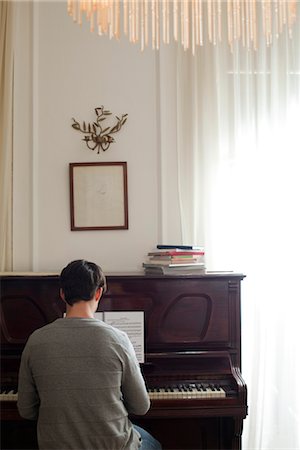I love to be able to play badly alone – pianist Mitusko Uchida (from an interview with journalist Joshua Barone)
Confined to our homes during the widespread lockdown to try and slow the spread of coronavirus, many of us are enjoying a period of enforced practising (a few of my pianist friends have teamed up using the Acapella app to play duets or 2-piano works, but it’s quite tricky to do this with successful results). Pianists are very used to being alone; solitariness is a natural state to the pianist, unlike other musicians who may be missing their ensemble partners and orchestral colleagues during this time of social and physical distancing. However, this period of enforced sequestration, while offering extra time to learn new and finesse existing repertoire, may not be ideal for the professional pianist whose working life is so closely allied to a busy diary of concerts for which music must be learnt and prepared. “I’ve only dabbled at the keyboard” a concert pianist friend wrote in a recent email to me. Another pianist friend complained that without concerts to prepare for, there was “no point” in practising, and, sadly, I know she is not alone in feeling this.
Amateur pianists meanwhile are rejoicing in this extra time and “dabbling” at the keyboard – snatching precious time to practice in between the commitments of work and family life – has been replaced by, for some, serious amounts of practising. For me, and I am sure others like me, one of the great pleasures of sitting at one’s piano with a stack of music on the lid or in the bookcase, waiting to be explored, is the opportunity to ramble through music and, to quote Mitsuko Uchida, “play badly alone”.
 When it’s just you, the instrument and the music, there is no one to judge, critique or comment – and if you liberate yourself from the pressure to play perfectly and the toxic inner critic, you can play with abandon and as badly as you like. Curiously, I find being given to permission to play like this often produces surprisingly encouraging results: I cruise, seemingly effortlessly, through sections which previously seemed intractable; particularly finger-twisting passages are executed with technical ease, and the music comes to life surprisingly imaginatively. It’s as if by not overthinking the music and letting go, we can actually bring greater creativity and expression to it.
When it’s just you, the instrument and the music, there is no one to judge, critique or comment – and if you liberate yourself from the pressure to play perfectly and the toxic inner critic, you can play with abandon and as badly as you like. Curiously, I find being given to permission to play like this often produces surprisingly encouraging results: I cruise, seemingly effortlessly, through sections which previously seemed intractable; particularly finger-twisting passages are executed with technical ease, and the music comes to life surprisingly imaginatively. It’s as if by not overthinking the music and letting go, we can actually bring greater creativity and expression to it.
Playing badly might be regarded as negative practising, but I believe any time spent at the instrument is useful, so long as one is not playing mindlessly or mechanically. Playing badly alone also gives one the opportunity to play purely for pleasure – and even concert pianists of the calibre of Mitsuko Uchida need to feel less than perfect on occasion and to be reminded of the pleasure of playing the piano, without the burden of deliberate practising.
And finally, playing something badly alone is the first step towards playing something well in performance…..think about it 🙂






Hello, my name is Jack. I am quite an amateur pianist, and am using all of this ectra time to get about eight hours of practice in a day. Due to this, there a small snippets of periods where i would be playing rather mindlessly, or simply my mind has wandered somewhere else. In this (brilliant) article, you have mentioned that it’s not a good idea to play “mindlessly and mechanically”. Can i ask why that is? Why is it that you have come to that conclusion? Thank you for your time.
Jack.
Hello Jack – thank you very much for your comment. I’m glad you enjoyed my article. Eight hours practicing a day sounds like a lot to me! Even professional pianists don’t practice for that long. Be careful not to overdo it! In terms of playing “mindlessly and mechanically”, I believe that whatever we are playing, whether it’s scales and arpeggios, exercises or pieces, we should always engage with the music, think as we play and reflect on our playing, and make adjustments based on those reflections. This form of self-critique is very important. There is another aspect, however, and you touch on it when you say your mind has “wandered elsewhere”. When we are concentrating on a task really hard, we enter a flow state, where we are in a state of “relaxed concentration”. It can feel as if you are slightly detached from the activity. My conclusions about piano playing and practicing are the result of 40 years playing and, in recent years, conversations with professional pianists and other musicians. As amateur pianists, we can gain a lot from understand how professionals practice – one of the things I’ve learnt that it’s quality of practice rather than quantity. You can do a great deal in 30 mins if you practice thoughtfully! Good luck with your piano studies.